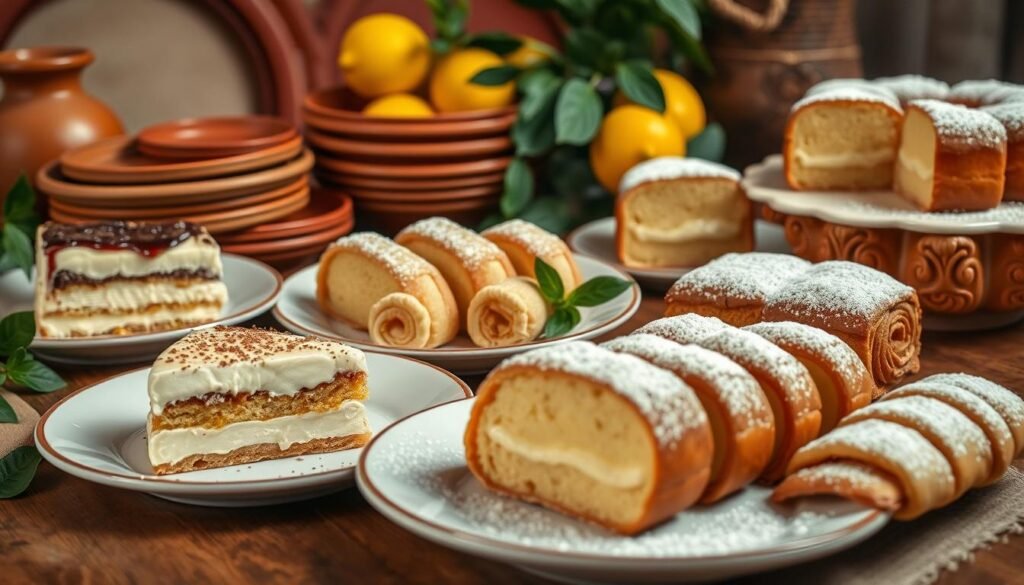Did you know Italians eat about 4.5 pounds of panettone each during the holidays? This shows the deep love for sweets in Southern Italy. There are over 18 amazing Southern Italian desserts to try. From creamy panna cotta to crunchy cannoli, these sweets have a long history.
Exploring these authentic Italian pastries, we’ll learn about special ingredients and cooking methods. Southern Italy is known for its wide variety of desserts. Each one has a story of tradition, flavour, and love. Let’s start this tasty journey and make these treats in our kitchens.
Key Takeaways
- Italian desserts showcase rich traditions and regional variations.
- Over 18 recipes include both classic and contemporary dessert options.
- Key ingredients like mascarpone, espresso, and Italian plums enhance the authenticity.
- Desserts range from creamy custards to refreshing frozen treats.
- Unique names reflect Italian cultural nuances in the dessert realm.
- Traditions like festive panettone consumption highlight Southern Italy’s festive spirit.
Introduction to Southern Italian Desserts
Southern Italian desserts are a sweet journey into Italian cuisine. They highlight the region’s fresh ingredients, bold flavours, and timeless recipes. Each dessert tells a story, showing the mix of cultures in Southern Italy.
These desserts mix rich cheeses, fresh fruits, and nuts. This blend of Mediterranean tastes makes every bite special. It takes you on a trip through Italy’s heritage. From festive cakes to daily treats, they offer a taste of Italy’s sunny shores.
Desserts in Southern Italy are linked to holidays and celebrations. They add sweetness to every special day. Grispelle and pitta ‘mpigliata are enjoyed during festivals, while bugie are a Carnevale favourite.
There’s a wide range of desserts to try, encouraging home cooks to experiment. Try making these treats at home and share them with loved ones. It’s a way to create lasting memories through sweet experiences.
The Unique Flavours of Southern Italy
Southern Italian desserts are a mix of flavours and ingredients. They tell the story of the region’s history. Each dessert has its own taste, thanks to local ingredients.
Key Ingredients in Southern Italian Desserts
What makes Southern Italian desserts special? Let’s look at the key ingredients:
- Ricotta Cheese: Found in many sweets like cannoli and pastiera.
- Citrus Fruits: Essential for desserts from the Amalfi Coast, thanks to lemons and oranges.
- Almonds and Hazelnuts: Add texture and flavour to traditional sweets.
- Local Honey: Adds sweetness and complex flavours to recipes.
These ingredients make desserts in Southern Italy unique. They offer a mix of sweetness and layers of taste.
Regional Variations in Desserts
Each southern region has its own desserts. These are shaped by local traditions:
- Sicily: Known for cannoli and cassata, with fresh ricotta and citrus.
- Campania: Famous for pastiera, a traditional Easter dessert with grains and ricotta.
- Puglia: Known for cartellate, doughnuts coated with vin cotto.
These desserts show the diversity and richness of Southern Italy. They highlight the unique traditions of each region.

| Ingredient | Region | Common Uses |
|---|---|---|
| Ricotta | All regions | Cannoli, pastiera |
| Citrus Fruits | Amalfi Coast | Cakes and pastries |
| Almonds | Sicily | Cookies, desserts |
| Honey | Calabria | Various sweets |
Exploring these elements helps us understand Southern Italian desserts. They are not just sweet treats. They are a true reflection of the region’s culture and diversity.
Classic Southern Italian Cakes
Exploring Southern Italian cakes reveals a world of rich flavours and textures. Each cake has a story of tradition and celebration. They showcase the region’s rich culinary heritage. Let’s look at three standout cakes that capture the essence of these beloved desserts.
Torta Caprese: A Chocolate Lover’s Delight
The Torta Caprese recipe is a dream for chocolate lovers. It comes from the island of Capri and is made with dark chocolate and ground almonds. This creates a moist and decadent treat.
It has a simple ingredient list: chocolate, eggs, butter, and sugar. The flavours are rich and beautiful. This cake is gluten-free and perfect for special occasions.
Pastiera Napoletana: A Ricotta and Wheat Pie
The Pastiera Napoletana is enjoyed during Easter. It celebrates spring with ricotta, candied fruits, and grains. The pie has a flaky crust filled with sweet ricotta.
This pie is a symbol of Easter desserts. Its history connects it to ancient celebrations. It’s a favourite at family gatherings and feasts.
Cassata Siciliana: A Colourful Sicilian Cake
The Cassata Siciliana is a stunning cake for festive occasions. It has layers of sponge cake soaked in liqueur. It’s filled with sweetened ricotta and chocolate.
The cake is decorated with marzipan and colourful candied fruits. Its preparation is intricate, but the result is breathtaking. It captivates the senses and leaves a lasting impression.
| Cake | Main Ingredients | Texture | Dietary Options | Occasion |
|---|---|---|---|---|
| Torta Caprese | Chocolate, Almonds, Eggs, Butter, Sugar | Moist and Dense | Gluten-Free | Special Occasions |
| Pastiera Napoletana | Ricotta, Candied Fruits, Wheat, Pastry Crust | Creamy and Flaky | Dairy-Based | Easter |
| Cassata Siciliana | Sponge Cake, Ricotta, Chocolate, Marzipan | Rich and Luxurious | Dairy-Based | Festive Celebrations |
Decadent Southern Italian Pastries
Southern Italy is home to heavenly pastries that will make your taste buds dance. You’ll love the Sfogliatella, Zeppole, and Cannoli. These pastries show the region’s rich culinary traditions and love for flavour. They’re perfect for any celebration.
Sfogliatella: A Delicate Shell Filled with Ricotta
The Sfogliatella is a layered pastry with a flaky outside and a sweet ricotta inside. Its texture is hard to resist. Making it requires patience, but the result is worth it, bringing Italy’s warmth to your table.
Zeppole: Delicious Cream-Filled Pastries
Zeppole are soft, round pastries filled with cream, enjoyed on Saint Joseph’s Day. You can try fried or baked versions. Topped with an amarena cherry, they’re a mix of indulgence and tradition, perfect for dessert lovers.
Cannoli: Crispy Shells Stuffed with Ricotta Cream
The Cannoli recipe lets bakers create crispy shells filled with sweet ricotta. It’s a treat loved worldwide, from Sicilian Cannoli to other versions. They offer a perfect mix of crunch and cream, great for any event.

Iconic Southern Italian Cookies
Southern Italian cookies are a sweet delight, great for any event. They show off the region’s rich food history. Favourites include biscotti, cantucci, and taralli, each with its own charm and role in Italian culture.
Biscotti: Perfect for Dipping
A classic biscotti recipe makes dry, crunchy cookies. They’re perfect with coffee or dessert wines. Made with almonds, these Italian cookies are baked twice for their unique texture. This simplicity makes them a favourite among home bakers.
Cantucci: A Tuscan Almond Cookie
Cantucci are similar to biscotti but have whole almonds and more almond flavour. From Tuscany, the cantucci recipe creates cookies that go well with Vin Santo. Enjoying them dipped is a classic Italian tradition.
Taralli: Savoury and Sweet Variations
Taralli are unique among Italian savoury biscuits because they can be either savoury or sweet. A basic taralli recipe mixes flour, olive oil, and wine. They’re often flavoured with fennel seeds or black pepper. Each bite is crunchy and satisfying, ideal for snacking or parties.
Mouth-Watering Puddings and Creams
Exploring Southern Italian desserts is a treat for the taste buds. Puddings and creams are comforting and perfect for any time. Let’s dive into three favourites: Budino, Zabaione, and Tiramisu.
Budino: A Silky Italian Pudding
The Budino recipe is all about creamy texture and rich flavours. You can find it in many flavours, from chocolate to caramel. It’s best served chilled, making it great for dinner parties or a cozy night in.
Zabaione: A Whipped Wine Cream Delight
Want to wow your guests? Try the Zabaione recipe. It’s a mix of egg yolks, sugar, and Marsala wine, creating a light treat. Enjoy it warm over strawberries or chilled with panettone for a delightful experience.
Tiramisu: A Classic Coffee Dessert
Tiramisu is a must-try Italian dessert. It’s made with mascarpone cheese, coffee-soaked ladyfingers, and cocoa powder. Easy to make but full of flavour, it’s the ideal end to an Italian meal.

Seasonal Southern Italian Delights
Seasonal desserts in Southern Italy add a special touch to meals. In summer, cool granitas refresh us. Winter brings warm, rich cakes. Each dessert tells a story of tradition and taste.
Summertime Granita: Refreshing Flavours
Granita is a summer favourite in Italy. Made from fruits, sugar, and water, it’s semi-frozen and refreshing. Flavours like lemon and almond are perfect for hot days.
It’s easy to make and a great way to end a meal. This makes granita a beloved summer treat.
Winter Cakes: Rich and Hearty Options
Winter brings a new set of desserts, like Italian cakes. These cakes, filled with dried fruits and nuts, warm us up. Panettone is a Christmas favourite, loved for its aroma and taste.
These cakes are more than food; they bring families together. They share stories and traditions across generations.

Southern Italian Fruit-Based Desserts
Southern Italy is famous for its tasty fruit desserts. These sweet treats celebrate the region’s fresh fruits. The Crostata di Frutta and Carruba are loved for their simplicity and tradition in Italian cooking.
Crostata di Frutta: A Fruit Tart Sensation
The Crostata di Frutta recipe is a stunning fruit tart. It has a buttery crust, rich pastry cream, and seasonal fruits. This dessert is not just delicious but also looks great, perfect for parties and celebrations.
It’s great because you can use different fruits in season. This means every bite is fresh and full of flavour.

Carruba: A Traditional Carob Dessert
The Carruba recipe is a traditional Italian dessert. It uses carob from Southern Italy’s carob trees. Carob has a sweet, earthy taste, making it perfect for desserts like cakes and pastries.
This dessert shows how Southern Italians use local ingredients. It’s a special part of their culture and cooking.
In Southern Italy, desserts often feature baked fruits. These include peaches, plums, and pears. They’re beloved in local cuisine for their natural sweetness and flavour.
Southern Italian Desserts for Special Occasions
In Southern Italy, celebrations are sweet with a variety of desserts. Each treat shows off rich traditions and cultural importance. These sweets are not just tasty but also carry the spirit of family and festive joy. Both Easter and Christmas have desserts that are key to these celebrations.
Easter Traditions: Sweet Treats
Italian Easter desserts are special, filled with traditional treats loved by all. Pastiera, a pie with ricotta and wheat, symbolises renewal. Pane di Pasqua, a sweet bread, adds colour to the table with its decorations.
- Pastiera – A traditional ricotta and wheat pie.
- Pane di Pasqua – Sweet Easter bread decorated with colourful sprinkles.
- Colomba Pasquale – A dove-shaped cake often enriched with candied fruits.
Christmas Delights: Panettone and More
Christmas in Southern Italy isn’t complete without Panettone. This tall treat, filled with candied fruits and nuts, symbolises community. Panettone recipes vary, each family adding their special touch.
| Dessert | Key Ingredients | Specialty |
|---|---|---|
| Panettone | Flour, sugar, butter, candied fruits, and yeast | A symbol of festive spirit |
| Torrone | Nuts, honey, egg whites, and citrus zest | A delicious nougat candy |
| Struffoli | Flour, honey, and colourful sprinkles | Small, sweet dough balls |

These traditional Italian Christmas desserts, along with Panettone, make every festive occasion warm and joyful. Sharing Panettone or Pastiera at Easter feasts adds to the celebration’s sweetness. Southern Italian desserts truly make every occasion special.
Authentic Recipes from Southern Italy
Creating authentic Southern Italian desserts at home brings Italy’s taste into your kitchen. With the right guidance, anyone can make homemade Italian pastries. Start by finding recipes from Calabria and Sicily, each with its own flavours and ingredients.
Preparing Traditional Desserts at Home
Many traditional Italian desserts use common ingredients. For example, Zeppole di San Giuseppe makes about 18 pastries. The batter needs:
- 1 cup water
- 1/2 cup unsalted butter
- 1 3/4 cups all-purpose flour
- 7 large eggs
The filling requires 1 1/8 cups of pastry cream. This includes extra egg yolks and 18 preserved amarena cherries. Each recipe is simple, making it easy to make these treats.
Tips for Perfecting Southern Italian Sweets
For success, follow key baking tips. Precision in measurements is crucial. Fresh ingredients are best for flavour. Here are some tips:
- Use accurate measurements, like for flour and sugar.
- Learn the baking techniques for classics like babà and tiramisu.
- Try different flavour combinations to find your favourite.
- Give doughs and batters enough time to rest.

With dedication and practice, you can master Southern Italian desserts. This journey improves your cooking skills and deepens your love for Italian desserts.
Conclusion: Embracing Southern Italian Dessert Heritage
Exploring Italian desserts is more than just enjoying sweets. It’s a dive into culture, memories, and family traditions. As you try Southern Italian sweets, you’ll make special moments with your loved ones. Each dessert tells a story from Southern Italy, reminding us to “Mangia bene, Vivi bene”—eat well, live well.
From the flaky layers of cannoli to the creamy tiramisu, these treats open a window to Italy’s rich history. In Perth, places like Tommy Sugo bring authentic Italian tastes to the table. Enjoying these sweets is a great way to connect with Italy’s heritage and share cooking joy with family and friends.
This journey is not just about recipes; it’s about togetherness. Making these beloved desserts helps keep Southern Italian cuisine alive. So, get your ingredients ready, invite your family, and let’s celebrate Southern Italian dessert heritage together.





